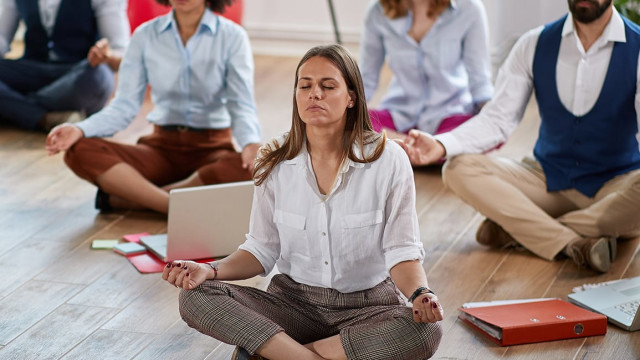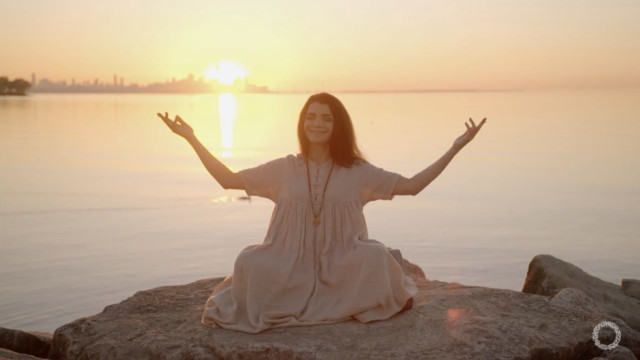Buddhism Helped Heal My Addiction

I began to practice mindfulness at a young age in solitary confinement at a juvenile detention center. But it took me many years and countless therapy sessions to truly look at the areas in my life that were at the root of my addictions. When I finally brought awareness to these dark parts and understood the angst and chaos they were causing, my true healing journey began.
My Drug of Choice: Bulimia
People struggle with all kinds of addictions — drugs, alcohol, sex, love, shopping, gambling, social media. There's a drug of choice for everyone, and bulimia was one of mine. The only way I can explain it now is that the high I used to get from binging on food and then purging felt like injecting heroin into my veins. At that moment, nothing else in the world mattered.
When I began my recovery process, my therapist told me that if I wanted to get better, I'd first have to learn to binge without throwing up. I'd have to learn to get bigger and take up more space in the world, literally and figuratively. And as with stopping any addiction, I'd have to find something in life that I wanted more than the high I got from this cycle of binging and purging. This all sounded nearly impossible to achieve. But Buddhism and mindfulness slowly helped me get there.
We Are Never Alone
When I learned that the first truth of Buddhism is suffering is universal, a lightbulb turned on inside of me and illuminated my whole life. Until then, I had always believed that I was the only one suffering, and I was ashamed of this suffering and of dealing with my addiction.
This, of course, only strengthened my addictive behaviors, as I was using them to numb my pain and shame. Knowing that I was not alone on this challenging path and that others suffered, too, softened something inside me and gave me a glimpse of hope.
The Power of Our Choices
With the realization of the second truth of Buddhism — that there is a path that leads to more suffering — I began to recognize the significance of my choices. I could see how my behaviors created more suffering for myself.
Whenever I experienced hurt, anger, or sadness, I would immediately fall back into my addictive behavior to numb the pain. But of course, after the initial high, this always made my suffering more intense and persistent. By looking at my actions, I began to understand how they impacted my livelihood, which motivated me to stay on the path to recovery.
Focus on the Good
The recognition of the third truth of Buddhism — that relief is the end to suffering — reminded me of how I tried to take my own life three times before the age of 18 because I believed that this was the only way to put an end to my pain. But Buddhism taught me that there are other paths and that relief can be found elsewhere. It made me realize that whatever I placed at the center of my life influenced my reality.
For me, addictive behaviors had taken the limelight for many years.
Meditation allowed me to find something positive to place at the center of my life instead. For people struggling with addictions like I was, recovery can become the main focus. This allows us to envision our highest potential and address all the external factors that affect prioritizing wholistic health.
Get Rid of Blame
To develop and personalize the commitment to recovery, we first need to focus on what has happened in our lives that led us down the path of addiction. We need to stop placing the blame on ourselves. By asking, "What has happened to me?" instead of, "What is wrong with me?" we can address childhood trauma and any other experiences that have conditioned how we interact with the world.
The reality is addictive behaviors are a response to our outside environment. For me, it was the result of many years of racial, familial, and childhood trauma. Being able to see this was a turning point in my life.
A Healing Path
Today, I host Buddhist and mindfulness addiction recovery programs. The approach of these programs is to help people come home to their bodies, which is difficult for anyone with addictive behaviors, as they are usually not aligned with the needs of their bodies.
We help people reestablish that connection and come home to the body by asking, "How can I begin to get in touch with my feelings? How can I begin to let go of negative stories and feel what's there?"
Whatever your path to healing may be — whether you choose a Buddhist, mindfulness, or integrated approach — I ask that you find a guide, teacher, or group to support you. They will allow you to talk through any memories, thoughts, sensations, or emotions that may come up, which are not always easy or pleasant to experience and process.
Working with a guide or a group will also provide a safe space to connect with others who may be experiencing the same thing as you. Remember the first truth of Buddhism? Suffering is universal. You are never alone. And whether you're struggling with addiction or with something else in your life, just like others, you can heal, too.
Try this Roundglass class, Wake Up Meditation: Set an Intention, by mindfulness coach Alison Hutchens.
Key Takeaways:
- Focus on the good.
- There's great significance in your choices.
- Stop placing blame.







